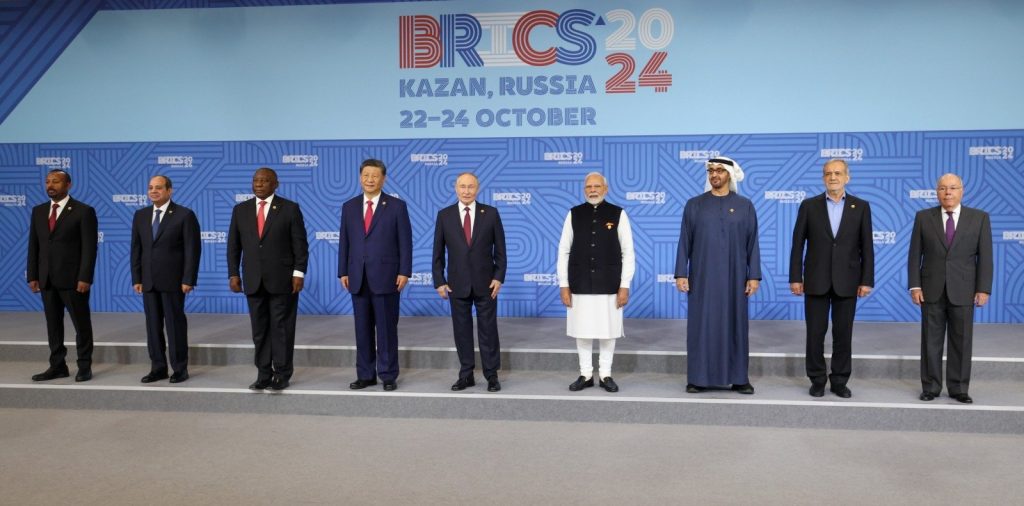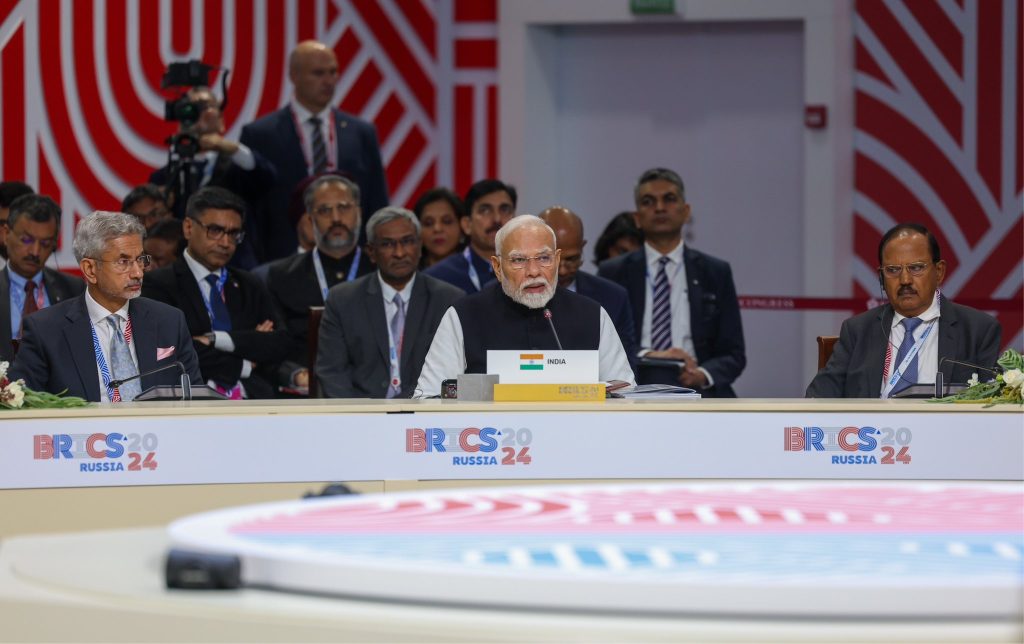
KAZAN, Russia: In the picturesque Russian city of Kazan, a new avatar of expanded and revivified BRICS 2.0 was born, with the promise of recasting the international order that is more aligned with aspirations of the Global South. The summit took place at a time when the cleavage between the West and the rest is sharpening divisions in a conflicted world. Against this backdrop, the Kazan summit was a clarion call for forging a reformed global governance architecture and a pointed message to the West that the Rest will not continue to sulk on the sidelines, but will seize the moment to reshape the world order.
With 13 countries coming in as partner countries and the addition of four new members at the last summit in Johannesburg, a reinvigorated BRICS is now emerging as an alternate G20, with Global South running the show amid increasing pushback by the West to reclaim its turf. The expansion of the grouping reflects the inclusive character of the new BRICS 2.0, marked by vibrant diversity, pluralism and openness to accommodating new voices and narratives.
The list of partner countries endorsed by BRICS members, done amid intense competition and lobbying, reveals the outline of this rejuvenated expanded grouping. Africa gets a bigger representation and voice in this new BRICS: Algeria, Uganda and Nigeria will join as partner countries, besides the addition of Egypt and Ethiopia at the Johannesburg summit. This marks a recognition of Africa’s growing global role, which was also underscored by the inclusion of the African Union at the G20 summit in New Delhi in 2023.
Latin America, an emerging region with some star economies, will now have Bolivia and Cuba as partner countries. In an important step to integrate ASEAN with BRICS, Indonesia, Malaysia, Thailand, and Vietnam have been added as partner countries. Central Asia is represented by Kazakhstan and Uzbekistan. The inclusion of Turkey, straddling Asia, and Europe, brings another major emerging country in the grouping. The partner country status paves the way for their inclusion as members in the near future, making it a formidable force in the international landscape. For the new members and partner countries, BRICS provides an alternative platform for climate finance, sustainable development and infrastructure areas where they feel Western-dominated institutions like the World Bank and IMF have failed them.
It’s difficult to day how this expanded BRICS will work as the addition of more countries will fuel power play that could diminish the efficacy of the grouping. The overarching message of the summit is crystallized in the Kazan Declaration, an ambitious document lays out BRICS’ shared vision for a more just and equitable world order. The declaration reaffirmed the grouping’s commitment to multilateralism, urging reforms in global governance to make international institutions more representative of emerging and developing economies.
The India Way

India, along with other founding members, played a pivotal role in shaping the Kazan Declaration. In his remarks, PM Modi pitched for a “people-centric BRICS” and called for accelerating reforms of global governance institutions. Underscoring the rise of the Global South, PM Modi also highlighted India’s initiatives that have been appreciated within BRICS, including the startup forum, the skilled workforce, Research and Development Vaccine Centre, digital health, and the digital public infrastructure, low-cost solutions for the countries of the Global South. Encapsulating the essence of this new expanded BRICS, Russian President Vladimir Putin underlined that the BRICS strategy in the global arena “conforms with the strivings of the main part of the global community, the so-called global majority.”
The expansion of BRICS at the Kazan Summit marks an ambitious step toward reshaping a multipolar world order, but the success of this exercise will depend on how the expanded BRICS will retain cohesion and coherence as new members and partner countries may bring their competitive interests to the BRICS agenda, which could complicate the process of forging consensus. BRICS will also have to keep a sharp eye on the West, which has been critical and derisive of the expansion of the grouping, with some commentators dismissing it as a staging ground for the Russia-China agenda to set the rules of the road by claiming leadership of the Global South.
In the days to come, the leader of BRICS countries will have to ensure that BRICS does not become a platform for anti-West posturing and raving, but an effective forum for a non-West counter-narrative in global politics that factors in interests of the Global South. The future of BRICS looks bright but to be counted it should not lose itself in power games but adheres to its core mandate of being a force for global public good and reform of the international order.
(Manish Chand, is CEO, Centre for Global India Insights, a think tank focused on global affairs, and Editor-in-Chief, India Writes Network and India and the World. He is in Kazan to report on and analyse BRICS summit.)
Author Profile

- Manish Chand is Founder and Editor-in-Chief of India Writes Network (www.indiawrites.org) and India and World, a pioneering magazine focused on international affairs. He is CEO, Centre for Global India Insights, an India-based think tank focused on global affairs.
Latest entries
 India and the WorldFebruary 17, 2026South-by-South: Focus on people-centric solutions at India AI summit
India and the WorldFebruary 17, 2026South-by-South: Focus on people-centric solutions at India AI summit India and the WorldFebruary 7, 2026Modi hails interim India-US trade deal, Goyal says no concessions made on agriculture
India and the WorldFebruary 7, 2026Modi hails interim India-US trade deal, Goyal says no concessions made on agriculture India and the WorldFebruary 2, 2026Trump announces trade deal with India, Modi ‘delighted’
India and the WorldFebruary 2, 2026Trump announces trade deal with India, Modi ‘delighted’ India and the WorldJanuary 31, 2026Palestinian minister bats for mediatory role for India in ending Gaza conflict
India and the WorldJanuary 31, 2026Palestinian minister bats for mediatory role for India in ending Gaza conflict







